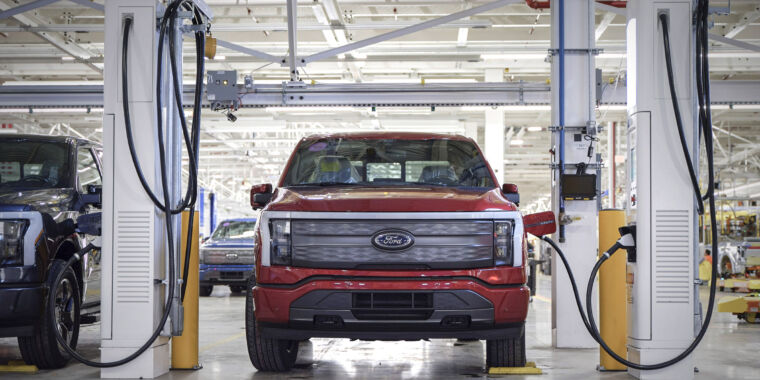Ford Navigates Electric Vehicle Market Challenges
Ford faces significant hurdles in navigating the complex landscape of the electric vehicle (EV) market. The company has made strategic decisions to scale back or delay the release of some of its anticipated EV models. For instance, a much-anticipated electric pickup that was slated for production next year has been postponed until 2026. Similarly, a three-row electric SUV has been pushed back by two years, now not expected to be available until 2027 at the earliest.
Despite these setbacks, Ford has reported a noteworthy 86 percent increase in EV sales during the first quarter of the year. In an unexpected move, the automaker has decided to shift its focus towards producing more hybrid vehicles. By the year 2030, Ford plans to offer hybrid alternatives for all its internal combustion engine-powered vehicles, signaling a strategic shift in its product development strategy. Although the current range of Ford hybrids is limited, it saw a substantial 42 percent growth in sales during the first quarter of 2024.
Hybrid Sales Surge Amidst EV Challenges
One standout performer in Ford’s lineup has been the Maverick Hybrid, with an impressive 19,660 units sold in the first quarter of the year. It is worth noting that despite Ford removing the hybrid powertrain as the base model for the 2024 Maverick, sales have remained strong, even with a subsequent price increase of $1,500. Overall hybrid sales for Ford in Q1 totaled 38,421 units, a significant milestone for the company.
While hybrid sales have shown promising growth, they still represent only a fraction of Ford’s total vehicle sales. EV sales, in particular, have not reached comparable levels, with total EV sales amounting to 20,223 units for Q1. The F-150 Lightning, one of Ford’s marquee EV offerings, saw an 80 percent increase in sales year over year, with 7,743 trucks sold. Despite this growth, traditional truck buyers have yet to fully embrace the transition to electric vehicles, as evidenced by the strong performance of Ford’s conventional F-series lineup.
Challenges and Opportunities in the EV Market
Despite the growing pains in the EV segment, Ford remains optimistic about its future prospects in the market. Notably, the Mustang Mach-E saw a substantial 77 percent increase in sales, with 9,589 units sold. Additionally, the E-Transit experienced a remarkable 148 percent growth, positioning Ford as one of the top-selling EV brands in the country.
However, Ford acknowledges that its EV division is likely to continue facing financial losses, projecting up to $5.5 billion in losses for 2024. Despite this, the company expects to offset these losses through strong sales of commercial and gasoline-powered vehicles. Ford is also actively investing in building battery factory joint ventures in key locations and is developing a smaller, cost-effective EV platform to streamline future production.
Market Trends and Industry Performance
The broader EV market in the United States is witnessing mixed trends, indicating both progress and challenges. While EV sales registered a modest 3.3 percent growth in Q1, the overall growth in car sales outpaced this figure at 5.1 percent. Notably, EV sales in the US experienced a 47 percent year-over-year growth in 2023, underscoring the market’s long-term potential.
Despite Ford’s EV struggles, other automakers thrived in the EV space during Q1. Rivian deliveries surged by 71 percent, while Kia and Hyundai saw substantial sales increases for their EV models. Audi also recorded impressive growth for its e-tron lineup, despite an overall decline in sales. However, not all automakers fared well, with Volkswagen reporting a decline in ID.4 crossover sales. Tesla, despite its market dominance, faced challenges in Q1, with a decline in deliveries and price cuts to manage inventory levels.
While the road ahead is fraught with challenges, Ford and other automakers remain committed to driving innovation and sustainability in the ever-evolving EV market. As consumer preferences continue to shift towards greener technologies, automakers must adapt their strategies to stay competitive in a rapidly changing industry landscape.
Image/Photo credit: source url





